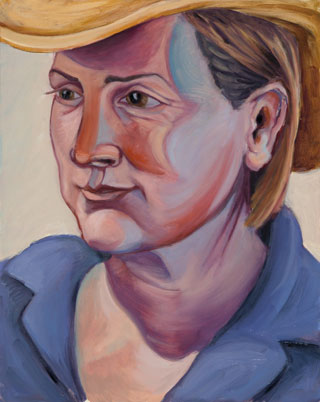“I really value now growing up in a way that showed me and a lot of my peers that you can live really simply in a way that was not deprived at all. That having less gives you more space and time to do interesting things.”
–Erin Noel
An Excerpt from the Interview
NCSCC: Were you and your brother on board with the move from San Diego up to here?
Erin Noel: Yeah, I think it was just a big adventure. I think that’s one of the cool things a lot of parents on the Ridge were able to create was a sense of excitement about being poor and about being simple, and there was a real ethic about the value of simplicity and peace. It wasn’t something, like we didn’t always have enough but we made do. So it wasn’t like… there were times when maybe we had pretty skimpy food, and times when we had plenty but it just wasn’t very spendy. Like I think it was once a year we’d get steak. My parents described themselves as economic vegetarians. I really value now growing up in a way that really showed me and a lot of my peers that you can live really simply in a way that was not deprived at all. That having less gives you more space and time to do interesting things. Like in Jerry Mander’s book The Four Arguments for the Elimination of Television, he talks about his experience coming home after school to having no television and starting off getting a snack and going to his room and just entering into this state of horrific boredom, like more and more and more bored, and it was like awful torture. And then he would have an idea and he’d go out and he’d do some cool project. So I think that’s something that happened to my brother and I also. We became horribly bored and had many interesting adventures including walking home one night late at night and being almost run over by a buck that was racing through the woods.
You know, there’s just all this kind of magical experience of the land around us and neighbors that we’d go visit who lived way back in the woods and lots of going to the river when a lot of the trails were much less developed, so they were really adventures. You’d be walking for a couple miles to get to your little secret spot.
•
Erin Noel: I’m sure the story of the building of Oak Tree School has been told by people. So basically just to recap, a bunch of hippies decided to build a school with all these different craftspeople. They did this beautiful school. Well, the year before I moved up here was the year that it was completed, and subsequently burnt down in this allegedly political act. You know, somebody didn’t like those people, those hippies building their school. And so the school was gone, and the result was that all the kids went to school in all kinds of weird places. And so the place I went to school was Toad Hall, which was a handmade, three story tall, about 15 by 15 foot house out Purdon Road on Boquest Drive that was — maybe it was four stories because there was this tiny room at the top. And it was like a tower, and then it had one big room kind of attached to it. And it was heated with a ship’s boiler for the first year. That was like a five foot diameter thing that you could only throw chunks of large log into, so it wouldn’t like stay lit if you just put firewood in there. So you had to put trees basically in it.
So you know, someone would come marching through the classroom with a large hunk of log and hurl it in the boiler. And the other interesting thing about that classroom was that no teachers were willing to go up the little ladder that lead to the fourth tiny floor, and so that was where the students would climb up there during recess and play poker. And so it was kind of wild times. And our teacher at the time was Joan Suzuki, who’s now Joan Little who was a principal until recently of our school, and she is kind of a no-nonsense person, so it’s a testament to how wild those times were that a teacher who is definitely a no-nonsense teacher would allow that to go on.
And it was also the site of an old town site, so all the kids would do archaeological digs out in the playground and present their findings. And we had all these great teachers. I think Hank Meals would come do archaeology stuff, and we also had all these great, incredible musicians. A lot of parents at that time were participating in schools, so we had Steve Sanfield come and tell stories and Jacquie Bellon would come and teach art and painting, and Kenny Miele would come and do songs with us and we had a lot of plays during that period of time too. So it was pretty interesting.
•
Erin Noel: In particular I remember Gary Snyder talking about the difference between he and this friend of his who had left the Bay Area, you know, kind of Beat generation folks. His friend had moved to far, rural Canada to get away from it all. Gary moved to the San Juan Ridge with several other folks with the intention of being… because it was close to mainstream culture, because he could still be involved, because it was in the checkerboard – land ownership pattern – of private/public alternating squares where we would have to deal with environmental impacts, where we would have to figure out a way of co-existing with these very different redneck neighbors that he was familiar with from growing up.
So he was definitely founding father of our (contemporary) community and had a very overt intention of not escaping. And so there was a really different tone, a lot of like bringing political activism here to kind of create a community that had a foot in both worlds. So that intention to like reinhabit our culture as opposed to abandon it. And so the story with he and his friend that he told I remember is then his friend went to Canada, he came here, had this great group of people who were able to increase parcel sizes, work with the forest service to get less logging to happen, all these changes happening in California that enable… like our forest looks still right around the Ridge – not elsewhere in Canada – but look pretty nice still, you know? There’s still old growth forest on the Ridge, though I’ve seen a lot of log trucks going down the road lately so I do wonder about that.
But his friend went up to Canada and immediately – it was clear – hundreds of acres of clear cut appeared around him, and his place burned heavily over the next few years and his home was devastated, and he ended up leaving this place that was his homestead? And I think of my uncles in Southern Utah who don’t believe in environmentalism, but just have this huge ranch. And ultimately he had to sell off all the ranch, and now they’re like a tiny inholding in a gigantic strip mall. And that was the first time that they were willing, when they came out visiting, they said you doing environmental law – you know, they hate environmentalists, they hate the Sierra Club. And then finally one of my Mormon elder uncles said I think you’re doing God’s work, working on protecting the land. Because it takes that, losing everything, to kind of realize that I think for a lot of folks.
So I think Gary Snyder’s intention was really different, and I think that really characterizes our community.

